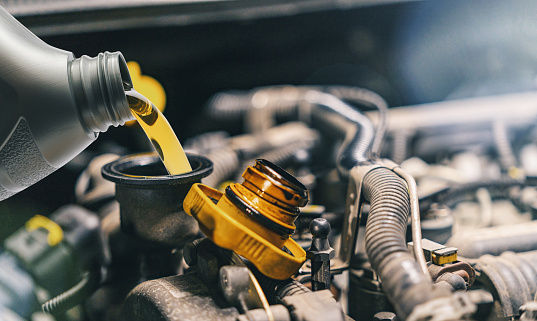Are you feeling confused about motor oil? Wondering when it’s the right time to change it? How often? What’s the best kind of oil? Here are some answers to the questions you might be asking:
When Should I Change My Oil?

First off, check your owner’s manual. The answer is in black and white, easy-peasy. Don’t make assumptions based on past experience or the standard 3,000-miles/3 months mantra that’s been chanted for decades. It’s different for each vehicle. Many cars, pickups, and SUVs now have service reminder that monitor and alert drivers when they need to change their oil. These systems can not only monitor miles but also analyze how hard a vehicle is being driven. Make sure you pay attention to these alerts!
How Often Should I Check the Oil Level?
You should keep an eye on your car’s oil levels—even newer cars can need their oil to be topped off between changes. We suggest checking your oil level at least once a month. Some newer cars have electronic oil monitors and don’t have traditional dipsticks. If you have a dipstick and are checking the oil yourself, make sure the car is parked on level ground. Also, be careful of hotspots under the hood if the engine has been running. Remove the dipstick, wipe off the oil, reinsert it and remove it again. The oil level is fine as long as the level is between MIN/MAX, L/H, or two pinholes on the dipstick.
How Often Should I Change the Oil?
Many automakers now have oil change intervals at 7,500-miles/6 months or even 10,000-miles/12 months. Of the car owners that pay careful attention to these specifications, most focus on mileage instead of time duration. But, if you drive less than average, be sure to follow the recommended time limits to keep your oil fresh. This is because, as oil ages, it becomes less effective. By not getting the engine warm enough, moisture that forms inside the engine is not removed. This leads to shorter engine life.
What Is the Right Oil for My Car?
Again, check your manual. It will tell you the correct weight and whether you should use synthetic or not. Synthetic oil is designed to be more effective and resists breakdown. It lasts longer and withstands higher temperatures. This is especially helpful if you take shorter trips when standard oil doesn’t get warm enough to burn off moisture and impurities. Synthetic oil is also effective for extreme heat or cold, and towing or hauling heavy material.
We all need a change from time to time! Your engine will last a long time if you treat it right. You can keep track of intervals yourself, or leave it up to us. We’ve been honored as the absolute best auto repair shop in America and always provide you with ethical and competent auto care.
